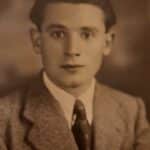
Miklos Schreiber, z"l (Hungary)
I was born on February 28, 1920, in the town of Mezőkövesd, Hungary. There were seven children in the family; four out of the seven survived the war. My father, Baruch (Belo) Lieber, was a professor at the university and a Judge in the Jewish Temple. My mother, Leonora Lieber, (maiden name Lovy) was a clothing designer.
In 1943, I was drafted into the Hungarian military to be used as slave labor. I was 23 years old. My mother cried when I left, but I told her not to cry, that I would never get lost. I never saw my mother again. My parents and younger brother, Arpad, who was only 9-10 years old, were gassed at Auschwitz Concentration Camp. My older brother Armin was by then already married and had two little children. They also never came back. Two other brothers were killed at the front.
When we were drafted, the Hungarian guards said that those who knew a trade were to step to the side. I had worked at a bakery before this, and I had started to become a tool and dye maker. They sent me to work in the bakery on a military base. I worked for about a year in the town of Jolsva.[1]
One day they took about 2,000 people, saying they were shipping us all to the Russian front. An angel behind my back told me not to go, and I escaped. I told them I needed to use the restroom and no one stopped me. I sneaked out in front of solders with guns and bayonets. I waited until it was dark, and when I didn’t hear any noises I went back to the bakery. Instead of going to Russia, I remained there in Hungary and continued to work at the bakery. The fear we lived in was constant; I don’t wish that fear on anybody.
As the war front came closer to us, they closed the military bases. They closed the base at Jolsva and moved people around. I was taken to the town of Várpalota, Hungary, closer to Austria, where I became the lead military baker. We didn’t have enough wheat so we mixed different grains and even saw dust (from an apple tree and from grapes) into our recipes.
One particular day, three young men entered the bakery looking for work. They were Jewish boys. My boss was nice and hired them, but later the Gestapo came and arrested all of us. I spent 10 days in jail and didn’t eat anything that entire time. They lined us up against a wall and said that those three Jewish boys were spies, then took them away. The Nazis told them they needed to prove they weren’t spies, and beat them up very badly. After those 10 days, they let us return to the bakery.
In the winter of 1944, I was shipped closer to Austria, to the city of Sopron on the Austrian border. Inside a large room, they made us strip. It was very cold with no place for us to sleep, and we went days without food. Soon after, they took us to the concentration camp at Siegendorf, Austria.[2]
They fed us very little at Siegendorf, giving us one piece of bread that we had to cut for eight people. They also added chemicals to our food so we wouldn’t have the strength to fight back. There were about 250 of us in one barracks room, with prisoners of war in another barracks. We made tank traps.
One day, as I walked outside with another prisoner, we noticed something that looked like a farm, and under the snow we found garlic and potatoes. All of a sudden a guard arrived, so I ran like an animal. The guard caught the other prisoner and killed him. He started to run after me, yelling, “Stop or I shoot you.” I stopped, and the guard hit me. He said that I was going to be punished for what I’d done, though nothing ever came of it.
The Russians liberated us in April 1945. I returned to Hungary, as did one of my sisters and two of my brothers. I went back to the bakery and worked there for a while, but on January 27, 1950, I arrived in the United States onboard the ship, “General McRae.” The ship was filled with immigrants from different European countries, including Germany.
I stayed in New York at first, and two days later I went to Detroit. Two months after I arrived, I started working in a bakery there. Then I went to Chicago, where I lived two years. Chicago was too cold for me, so I moved to Los Angeles, where I lived 53 years and worked at various jobs. I moved to Tucson in 2010 so that I could be near my brother James.[3]
[1] Jolsva, now Jelsava, is in Slovakia.
[2] When the Soviet Red Army was close to Siegendorf concentration camp, the Hungarian guards there executed nearly all of the camp’s prisoners.
[3] James Lieber’s own account of his Holocaust experience can be found in Volume I of To Tell Our Stories.
